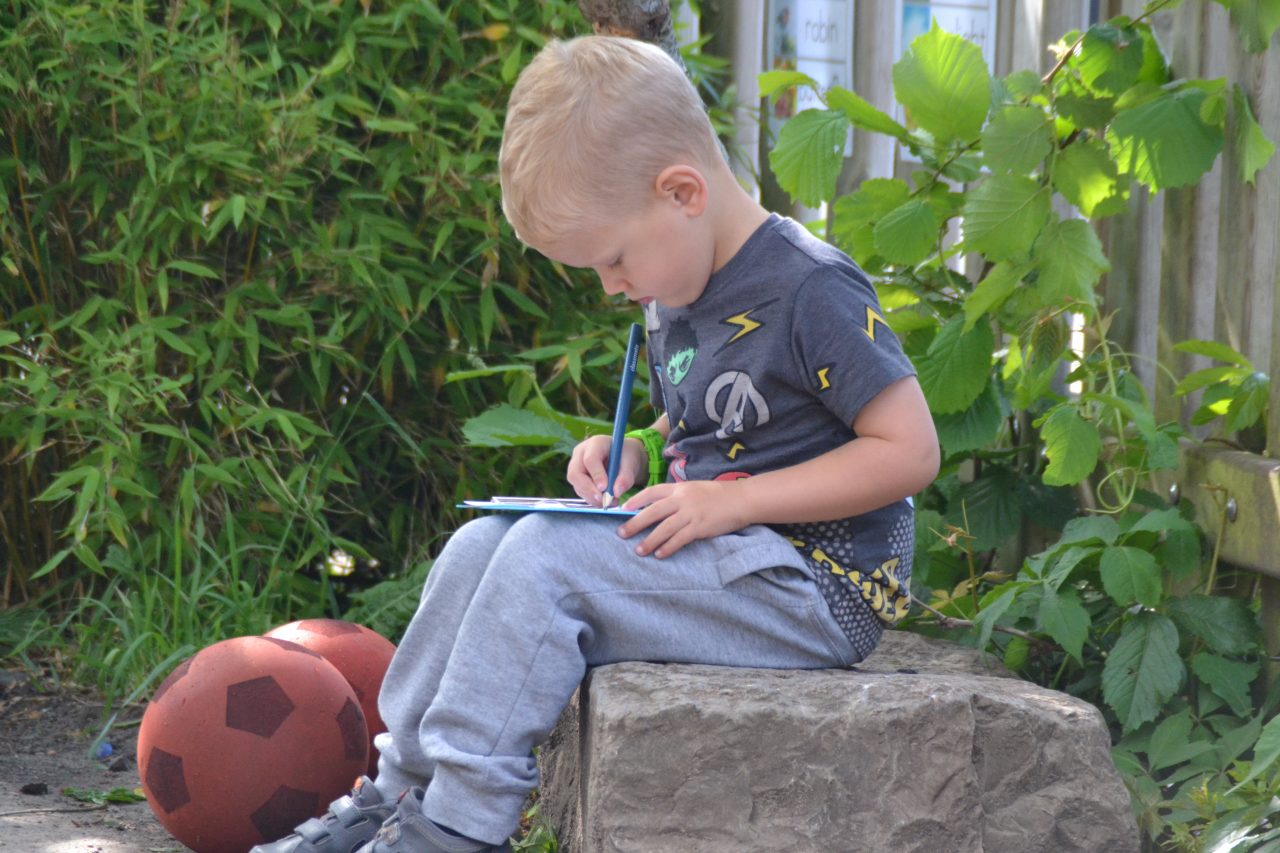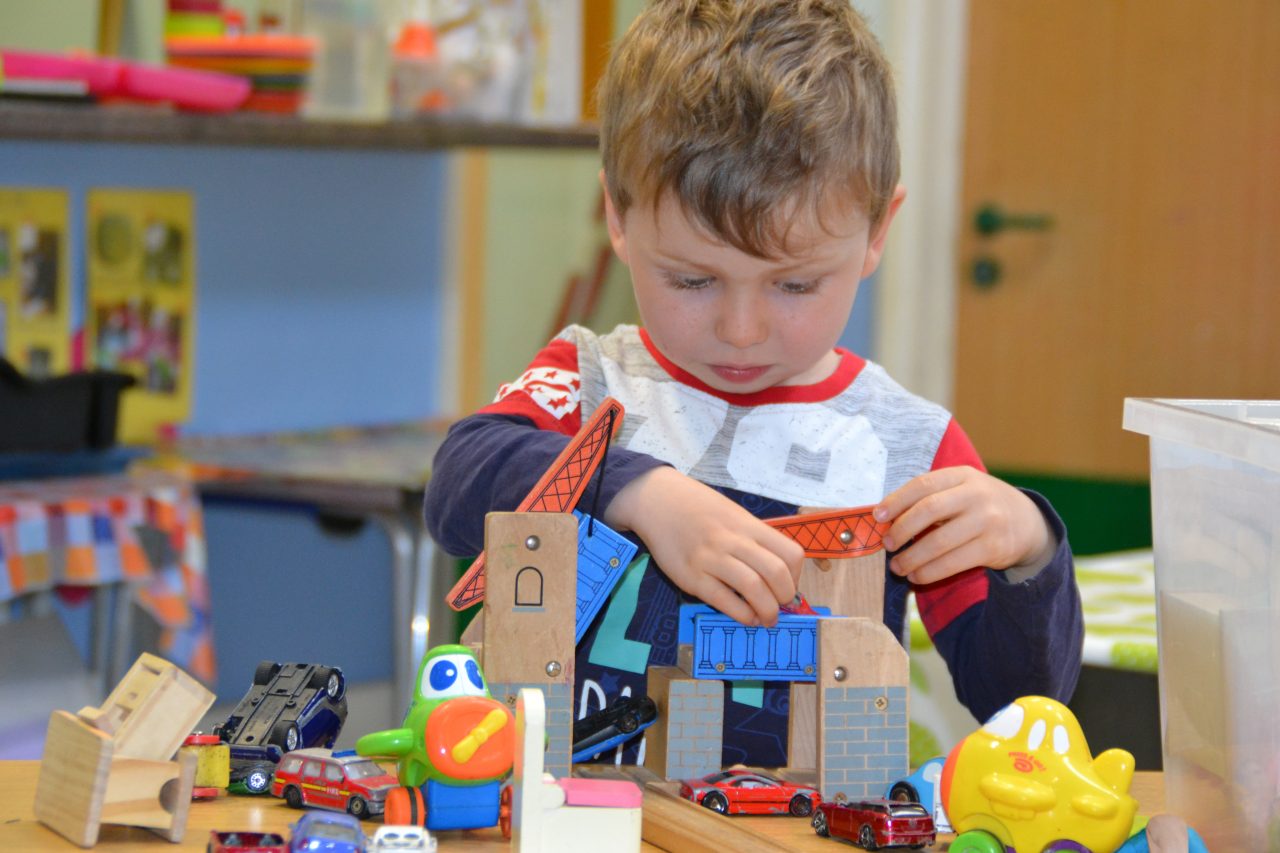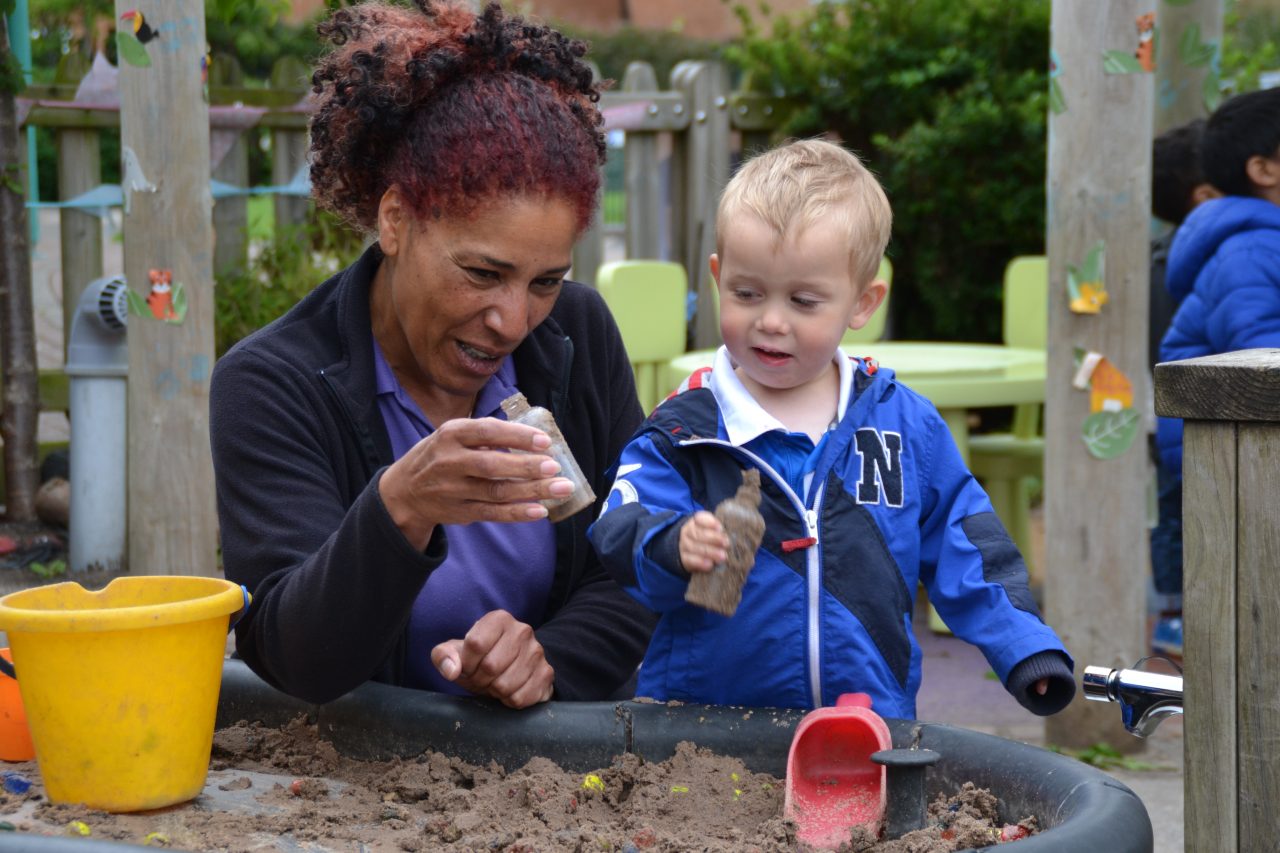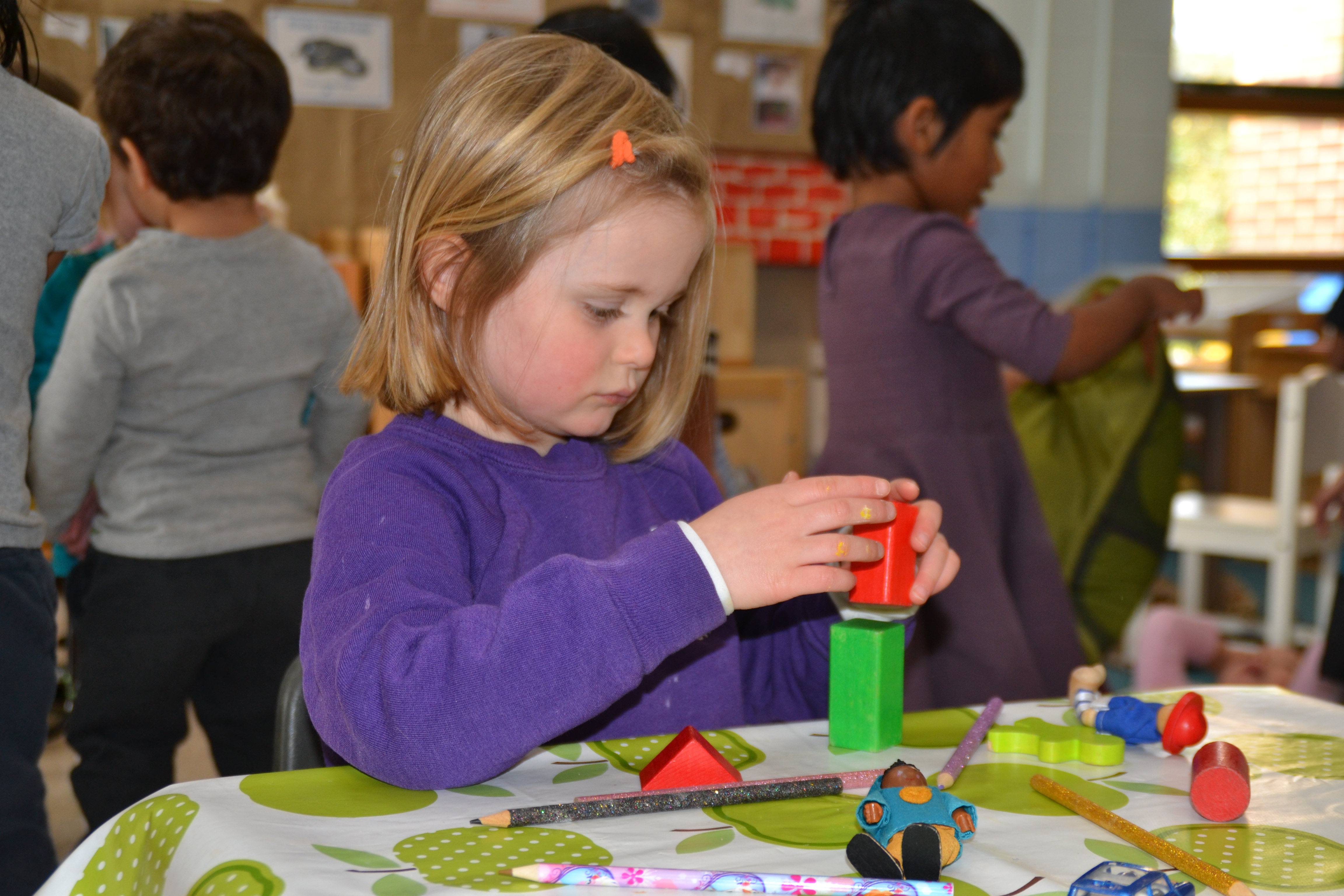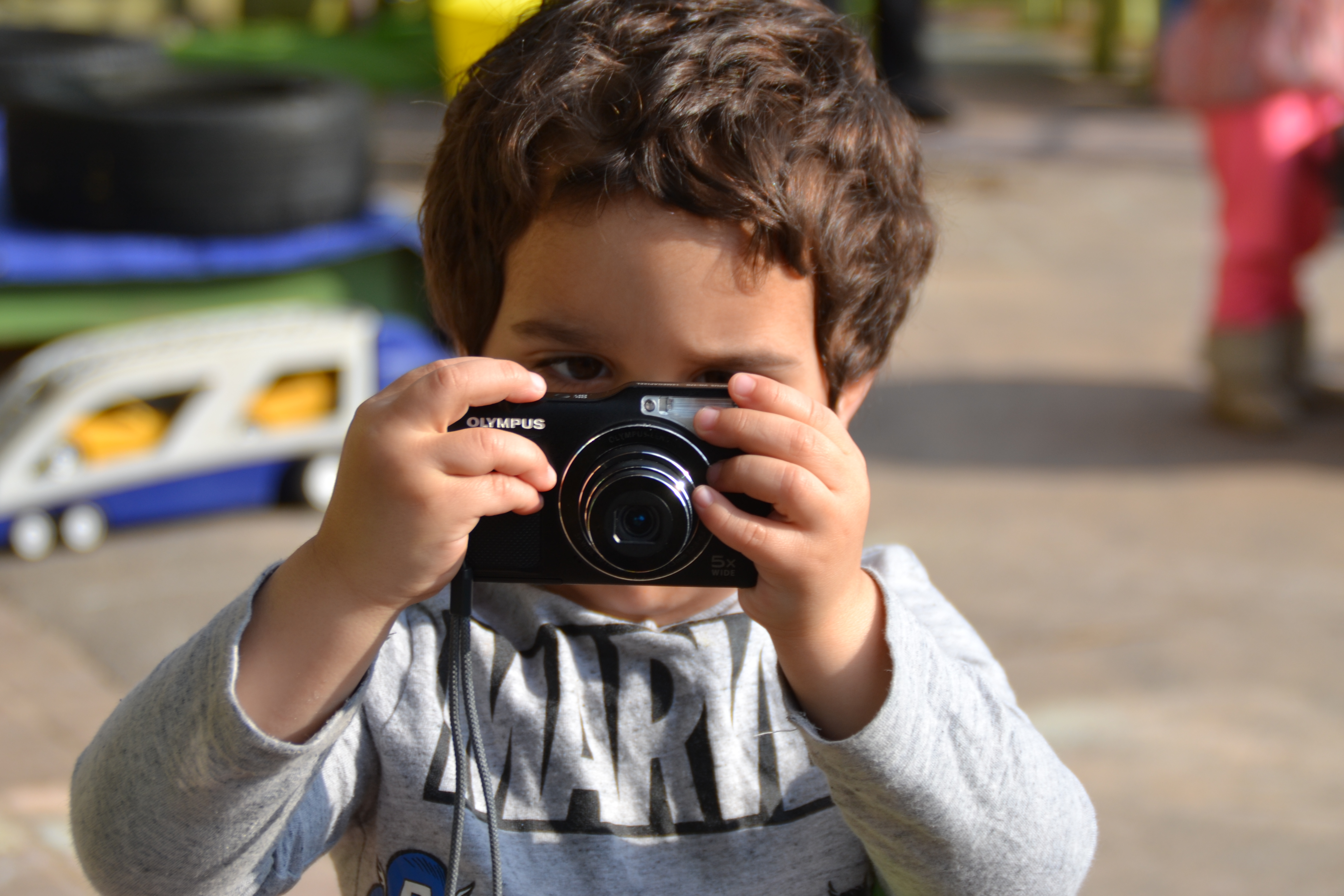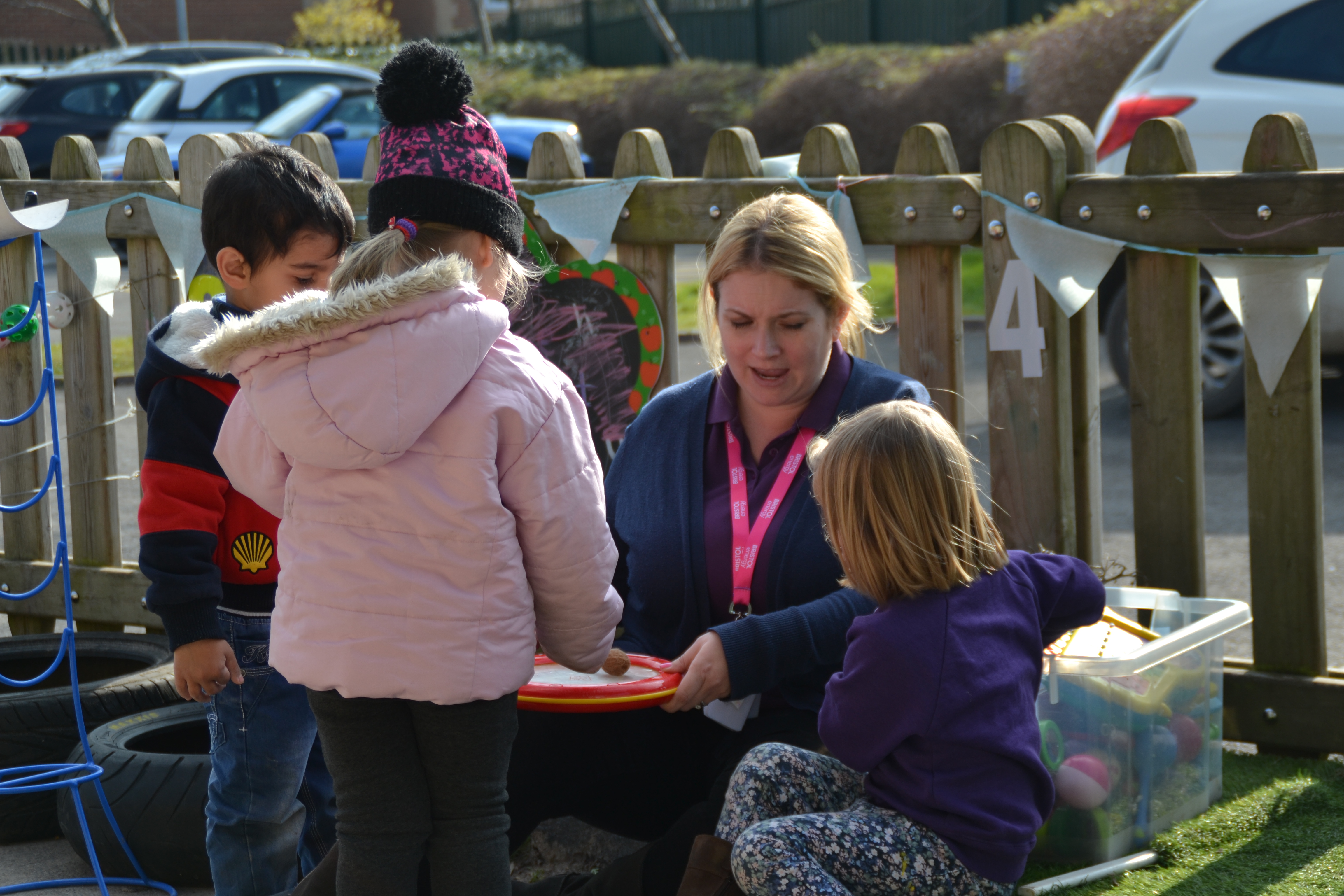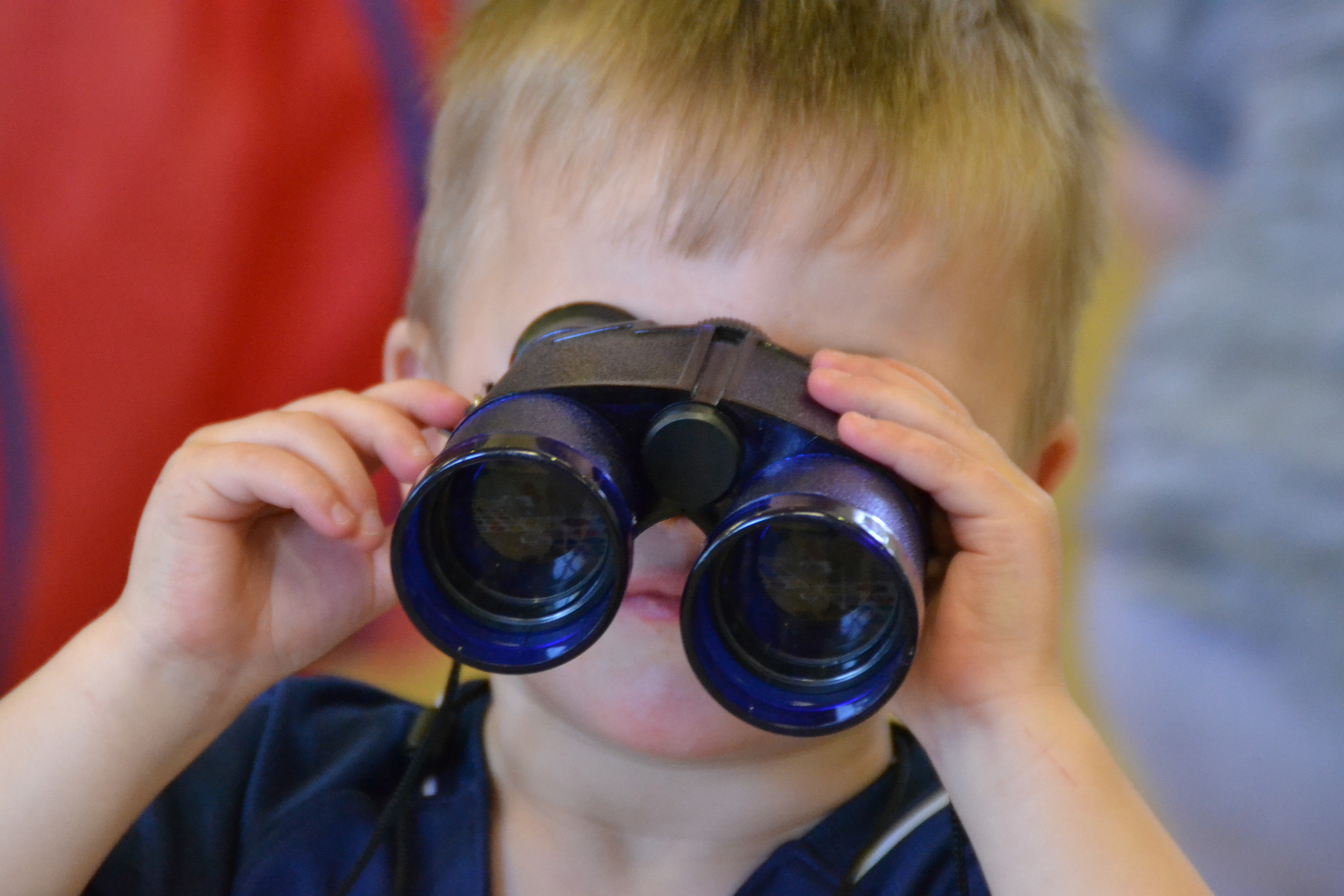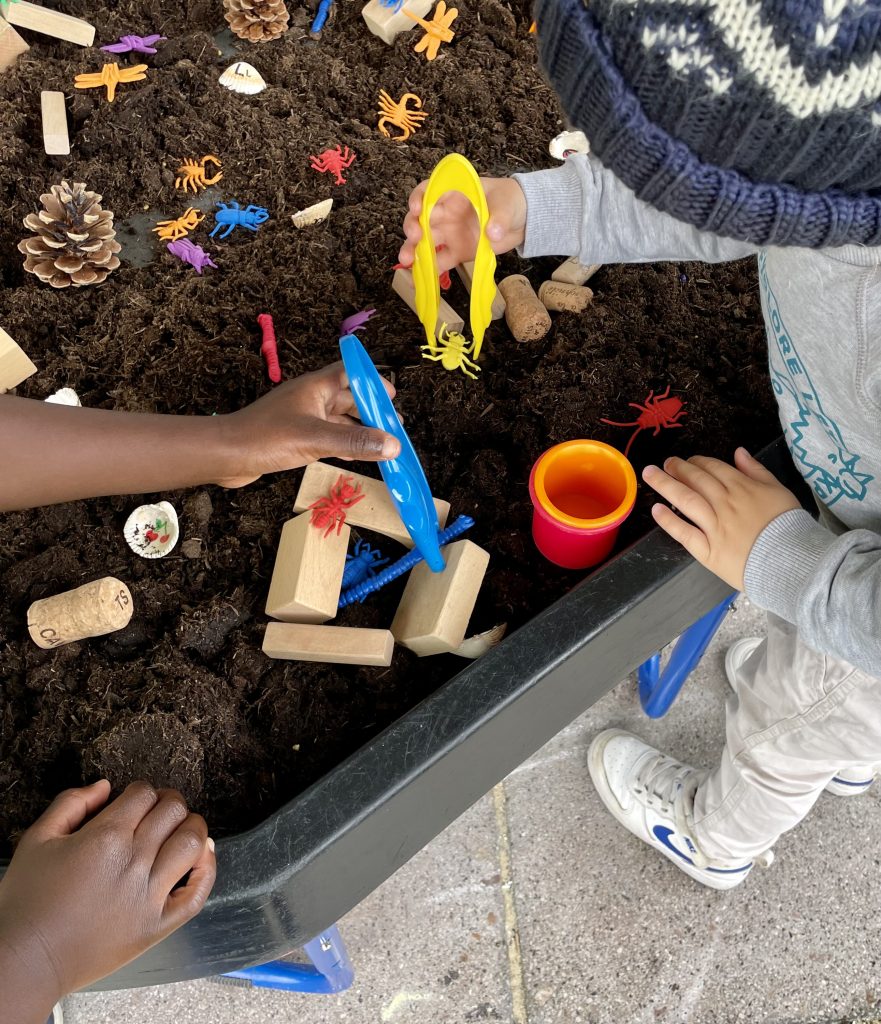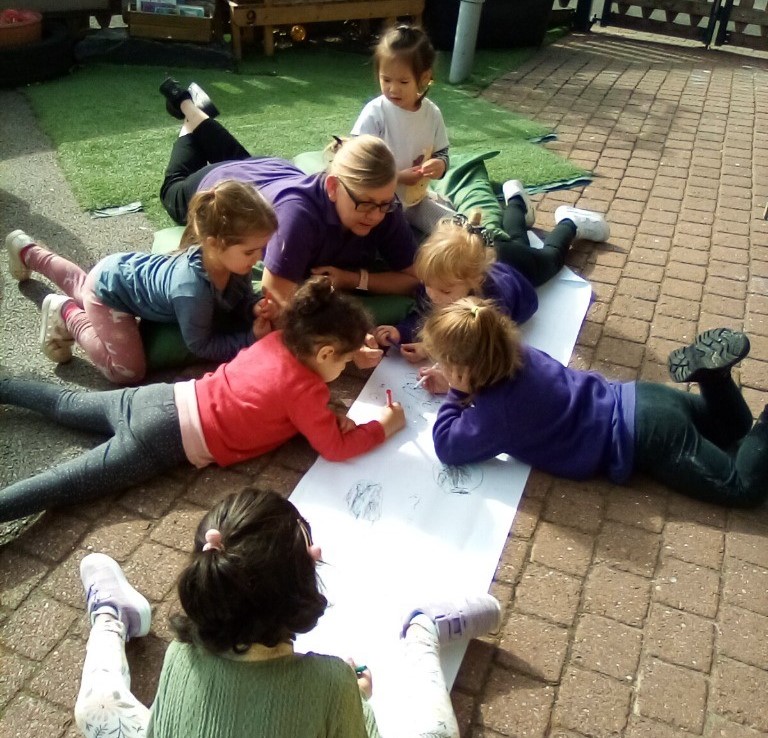Early years prospectus
Our mission is to enhance every child’s development and their education in a safe, secure, and stimulating environment. We will ensure each child has equal opportunities together with their families.
About us:
L A Childcare has been running for several years. All our staff are experienced qualified practitioners, first aid trained, safeguarding trained, DBS (disclosure barring service) checked. Our staff regularly attend training courses to enhance their knowledge in the Early Years Sector. All staff are aware of social network policies and online agreements and adhere to these rigorously.
Each setting is very individual, but each setting promotes the same ethos. Self-evaluation by the staff reflects our practice and with this we can monitor areas of success and areas that need improving and act accordingly to improve in these areas. Each setting has an experienced SEND member of staff (special needs) who is trained to work with our SEND children. All SEND staff will liaise with other local authority agencies to ensure inclusive practice in all of our settings. We also have a member of staff dedicated to support children who have English as an additional language.
Children can join us from two years of age. All children are monitored and assessed, and observations are completed using our online system, Tapestry. We encourage our parents to work closely with our staff to ensure that children’s needs are met and enhanced accordingly.
We aim to:
- Provide high quality care and education for children below statutory school age.
- Work in partnership with parents to help children to learn and develop.
- Add to the life and well-being of the local community
- Offer children and their parents a service that promotes equality, values and diversity.
Parents
Parents are regarded as members of our setting who have full participatory rights. These include the right to be:
- Valued and respected
- Consulted
- Involved
- Included in all areas
We love all our parents to get involved with the pre-school in any way they are able. Regular ‘Stay and Play’ sessions are held for family members and carers to come in and share experiences. If you would like to speak to a member of staff, we do have an open-door policy. However, the safeguarding of the children is paramount so please do not be offended if you are asked to wait, or to arrange a more suitable time to address your query. Staff will not be able to discuss issues whilst children are entering or departing the building at the beginning and end of the session.
The Individual Child:
We aim to ensure that each child:
- is in a safe and stimulating environment.
- is given care and attention, and the correct ratio of children to staff is adhered to.
- has a chance to join with other children and adults to live, play, work and learn together.
- is helped to take forward her/his learning and development by being helped to build on what she/he already knows and can do.
- has a personal key person who makes sure each child makes satisfactory progress and plans activities to achieve these outcomes
- is in a setting that sees parents as partners in helping each child to learn and develop.
- parents help to shape the service we provide
Children’s development and learning
The provision for children’s development and learning is guided by The Early Years Foundation Stage (DfE 2012). Our provision reflects the four overarching principles of the statutory framework for the Early Years Foundation Stage.
|
A Unique Child Every child is a unique child who is constantly learning and can be resilient, capable, confident and self-assured. |
|
Positive Relationships Children learn to be strong and independent through positive relationships. |
|
Enabling Environment Children develop and learn and develop well in enabling environments, in which their experiences respond to their individual needs and there is a strong partnership between practitioners, parents and carers. |
|
Learning and Development Children develop and learn in different ways. The framework covers the education and care of all children in early years’ provision including children with special educational needs and disabilities. |
How we provide for development and learning
Children start to learn about the world around them from the moment they are born. The care and education offered by our setting helps children to continue to do this by providing all the children with interesting activities that are appropriate for their age and stage of development.
|
The Area of Development and Learning comprises of 3 Prime Areas Personal, social and emotional development.
Physical development
Communication and language.
Specific Areas
|
For each area, the level of progress children should be expected to have attained by the end of the Early Years Foundation Stage is defined by the Early Learning Goals. These goals state what it is expected that children will know and can do by the end of the reception year of their education.
The ‘Development Matters’ guidance sets out the likely stages of progress a child makes along their learning journey towards the early learning goals. Our settings have regard to these matters when we assess children and plan for their learning.
Personal, social and emotional development
Our programme supports children to develop:
- Making relationships
- Self-confidence and self-awareness
- Managing feelings and behaviour
Physical development
Our programme supports children to develop:
- Moving and handling
- Health and self-care
Communication and language
Our programme supports children to develop:
- Listening and attention
- Understanding
- Speaking
Literacy
Our programme supports children to develop:
- Reading
- Writing
Mathematics
Our programme supports children to develop:
- Numbers
- Shape, space and measure
Understanding the world
Our programme supports children to develop:
- People and communities
- The world
- Technology
Expressive arts and design
- Exploring and using media and materials
- Being imaginative
Literacy:
Children are helped to understand that written symbols carry meanings to be aware of the purposes of writing and, when they are ready, to use drawn and written symbols themselves. We have a book area and children are encouraged to bring books in from home to share with us. They are also taught the importance of handling books correctly.
Mathematics:
By means of adult-supported experience, children become familiar with sorting, matching, ordering, sequencing, and counting activities which form the basis for early mathematics. There are opportunities both inside and outside to count objects, solve practical problems, Children are assisted to learn and use vocabulary of mathematics identifying objects by shape, position, size volume, and number. Songs, games and pictures books help children become aware of number sequences. Children have access to IT games to play and learn.
Understanding the world:
A safe and stimulating environment allows children to observe and experiment with a range of natural and manufactured products. They learn to recognise patterns and similarities and to share and record their findings. Children are assisted in exploring and understanding their environment both within the Pre-school and in the wider community. They learn to respect each other and to be respected. A range of safe and well-maintained equipment enables children to extend their technological understanding, using simple tools and techniques as appropriate to achieve their intentions and to solve problems. Children are introduced to a range of ICT equipment such as remote-controlled cars, cameras, IT equipment.
Expressive arts and design.
Children are encouraged to use a wide range of resources to express their own ideas and feeling, and to construct their individual response to experience, in two and three dimensions. Art equipment, including paint, glue, crayons, and pencils as well as natural and discarded recycling resources provide for open ended exploration of colour shape and texture and the development of skills in painting, drawing, and collage. Children join in with and respond to music and stories, and there are many opportunities for imaginative role play, both individually and as part of a group.
Our approach to learning and development and assessment
Learning through play
Play helps young children to learn and develop through doing and talking, which research has shown to be how young children learn to think. Our settings use the Early Years Foundation Stage ‘Development Matters’ guidance to plan and provide a range of play activities which help children to make progress in each of the areas of learning and development. In some of these, children decide how they will use the activity, and, in others, an adult may take the lead in supporting the children to take part.
‘In the Moment Planning’
Our teaching is delivered through ‘In the moment planning’, where ‘teachable moments’ are discovered through children’s play. This unique method allows us to support the development of each child at their own individual pace, using their own interests.
This also allows us to scaffold the ‘child lead’ play to support any learning objectives we may have. The spontaneity of the planning also enables us to enrich what the children “see” and are fascinated by… who can say what a child wants to explore tomorrow or even in the next five minutes?!…. It is an exciting journey to share with them and we completely embrace this style of “teaching”.
In the moment planning is about seizing the moment based on what the children are already deeply involved in. Its about capturing the moment of engagement and running with it to support the children’s progress.
Characteristics of effective learning
We understand that all children engage with other people and their environment through the characteristics of effective learning that are described in the Development Matters guidance to the Early Years Foundation Stage as:
- Playing and exploring – engagement
- Active learning – motivation
- Creating and thinking critically – thinking
We aim to provide for the characteristics of effective learning by observing how a child is learning and being clear about what we can do and provide to support each child to remain an effective and motivated learner.
Assessment
We assess how young children are learning and developing by observing them frequently. We use information that we gain from observations, as well as from photographs or videos of the children, to document their progress and where this may be leading them. We believe that parents know their children best and we ask them to contribute to assessment by sharing information about what their children like to do at home and how they as parents are supporting development. We currently use Tapestry an online system which parents have access to and can monitor, and add achievements to it.
We make periodic assessment summaries of children’s achievement based on our ongoing development records. These form part of children’s records of achievement. We undertake these assessment summaries at regular intervals as well as times of transition, such as when a child moves into a different group or when they go on to school.
The progress check at age two
The Early Years Foundation Stage requires that we supply parents and carers with a short-written summary of their child’s development in the three-prime learning and development areas of the EYFS: personal, social and emotional development; physical development; and communication and language; when a child is aged between 24 – 36 months. The key person is responsible for completing the check using information from ongoing observational assessments carried out as part of our everyday practice, taking account of the views and contributions of parents and other professionals.
Records of achievement
The setting keeps a record of achievements for each child. Staff and parents working together on their children’s records of achievement is one of the ways in which the key person and parents work in partnership. Your child’s record of achievement helps us to celebrate together her/his achievements and to work together to provide what your child needs for her/his well-being and to make progress.
Your child’s key person will work with you to keep this record. To do this you and she/he will collect information about your child’s needs, activities, interests, and achievements. This information will enable they key person to identify your child’s stage of progress. You and the key person will then decide on how to help your child to move on to the next stage.
Working together for your children
In our setting, we maintain the ratio of adults to children in the setting that is set through the Safeguarding and Welfare Requirements.
This helps us to:
- Give time and attention to each child.
- Talk with the children about their interests and activities.
- Help children to experience and benefit from the activities we provide; and
- Allow the children to explore and be adventurous in safety.
Opening times
- We are open for 38 weeks each year.
- We are open Monday to Friday inclusive during term time. Each Pre-school’s opening hours are displayed on their notice boards.
- Children who have reached the term after their third birthday can benefit from the governments funding which offers 15 hours a week free childcare each week which can be taken in either morning, afternoon or all-day sessions. With effect from September 2017 this will be extended to 30 hours a week subject to some criteria. Any hours taken over this amount is charged at an hourly rate but must be in blocks of three hours.
- Funding for two-year-old places are offered again subject to some specific criteria.
We provide care and education for young children from aged two years until school age.
How parents take part in the setting
Our setting recognises parents as the first and most important educators of their children. All the staff see themselves as partners with parents in providing care and education for their child. There are many ways in which parents take part in making the setting a welcoming and stimulating place for children and parents, such as:
- Exchanging knowledge about their children’s needs, activities, interests and progress with the staff.
- Contributing to the progress check at age two.
- Sharing their own special interests with the children.
- Helping to provide, make and look after the equipment and materials and curriculum provided by the setting.
- Joining in community activities in which the setting takes part; and
- Building friendships with other parents in the setting.
The parents stay and play sessions
Parents, grandparents, guardians are occasionally invited into the setting to join in with the routine. We are always grateful for input by our parents particularly during multi-cultural festivals and we encourage any parents to join us during these celebrations. We are grateful for any parents who can donate stories, games in their respective language that we can share with our children.
Key persons and your child
Our settings use a key person approach. This means that each member of staff has a group of children for whom she/he is particularly responsible. Your child’s key person will be the person who works with you to make sure that what we provide is right for your child’s needs and interests. When your child first starts at the setting, she/he will help your child to settle and throughout your child’s time at the setting, she/he will help your child to benefit from the setting’s activities.
Learning opportunities for adults
As well as gaining qualifications in early years’ care and education, our staff take part in further training to help them to keep them updated with thinking about early years’ care and education. All staff undertake safeguarding qualifications, the manager doing the advanced course first aid training, prevent duty, FGM training. These are in addition to courses which run to further develop their skills and understanding of further topics which are then introduced at the pre-schools. In addition, in house training is provided.
The setting’s timetable and routines
Our setting believes that care and education are equally important in the experience which we offer children. The routines and activities that make up the day in the setting are provided in ways that:
- Help each child to feel that she/he is a valued member of the setting.
- Ensure the safety of each child.
- Help children to gain from the social experience of being part of a group; and
- Provide children with opportunities to learn and help them to value learning.
The session
We organise our sessions so that the children can choose from, and work at, a range of activities and, in doing so, build up their ability to select and work through a task to its completion. The children are also helped and encouraged to take part in adult-led small and large group activities which introduce them to new experiences and help them to gain new skills, as well as helping them to learn to work with others.
Outdoor activities contribute to children’s health, their physical development, and their knowledge of the world around them. As well as an outdoor play area, we take the children out into the local community. The setting organises the session to take account of children’s changing energy levels.
Snacks and meals
The setting promotes healthy eating, and would like each child to bring in a piece of fruit, or vegetable suitable for snack time daily, which will be shared amongst the children, as snack time is a social time at which children eat together.
Where possible please can you prepare the fruit or vegetable – for example grapes and cherry tomatoes to be cut in half lengthways. We have a strictly no nuts policy. A drink of milk or water is provided unless your child has any special dietary requirements. Water is available throughout each session although we request each child brings in their own named, filled, drinks bottle (no fizzy drinks)
As part of our commitment to healthy eating it is requested that the children bringing in packed lunches have food in them which is healthy and nutritious. As there is no fridge or cool box, please can an ice pack be placed in each lunch box as deemed necessary. Please ensure that all sandwich boxes and drinks containers are clearly marked with your child’s name.
If for any reason a child forgets their packed lunch, the staff will provide a packed lunch and drink, the cost of which will be met by the parent/guardian, a receipt will be provided.
When it is your child’s birthday, you are most welcome to bring in some cakes to share, again, nothing which contains nuts, and suitable for vegetarians if possible.
Policies
The setting’s policies help us to make sure that the service provided by each setting is a high quality one and that being a member of the setting is an enjoyable and beneficial experience for each child and her/his parents/carers. The setting’s policies are available on request.
Safeguarding children
Our setting has a duty under the law to help safeguard children against suspected or actual ‘significant harm’.
Our employment practices ensure children against the likelihood of abuse in our setting and we have a procedure for managing complaints or allegations against a member of staff. Our way of working with children and their parents ensures we are aware of any problems that may emerge and can offer support, including referral to appropriate agencies when necessary, to help families in difficulty.
SEND
As part of the setting’s policy to make sure that its provision meets the needs of each individual child, we take account of any special needs a child may have. Our Special Educational Needs Co-ordinator details are on our notice board.
Fees
Fees must be paid within the first two weeks of term, failing this an additional charge for admin will be incurred. The fees policy is displayed on the notice board and written on your fees invoice together with our BACS details. Please note that failure to pay fees could result in the loss of your child’s place at the pre-school and given to another child. Fees can usually increase in the Autumn term, but we have the right to increase fees at any time.
If you are claiming the Nursery Education Grant, any additional hours taken must be paid for. Upon registering your child, we must have copy of your child’s birth certificate and see the original certificate. Parents/guardians claiming 30-hour funding must provide us with a code from South Gloucestershire Council, a national insurance number and birth certificate before we can process the funding.
The nursery education grant funding only covers 38 weeks of the year this occasionally might be subject to change. If the term is longer than 38 weeks any additional cost will be met by you. It is a condition of attending the pre-school that you agree to the pre-school term dates if they have been extended. If at any time your child is ill or if you take them on holiday full fees are still payable. If for any unforeseen circumstances such as severe weather conditions, no premises heating for example again full fees must be paid. Notification of a closure will be notified via Tapestry, Facebook, and our Website. If your child is absent from pre-school for a period of a week due to illness or holidays, we require a letter from you outlining the reason why. This is a South Gloucestershire Council requirement. If your child is absent due to illness please contact the pre-school to advise them in the morning. Please DO NOT ALLOW your child to come into pre-school if they have any sickness or diarrhoea for a period of 48 hours. In the case of forced closure by the government ,fees still will have be paid and no refund will be given. This will be reviewed after 5 days.
There will be an additional charge added for some children that attend, and this will be charged at an hourly rate. This charge is to cover cleaning and consumables.
Notice Period
A period of 6 weeks’ notice is required to cancel a child’s place. We will not accept notice during the summer term.
Starting at our setting
We want your child to feel happy and safe with us. To make sure that this is the case, the staff will work with you to decide on how to help your child to settle into the setting.
Late Collection
Parents will be charged £10 for every ten minutes for lateness in collecting their child at the manager’s discretion. Additional charges for hall hire may be added.
Clothing
We provide protective clothing for the children when they play with messy activities, however we suggest your child wears old clothing that you do not mind getting dirty or wet. We encourage children to gain the skills that help them to be independent and look after themselves. These include taking themselves to the toilet and taking off and putting on aprons and outdoor clothes. Clothing that is easy for them to manage will help them to do this. Please bring in nappies (no pull ups) wet wipes and nappy sacks if your child is not toilet trained.
GDPR General Data Protection Regulation
The Data Protection lead is Helen Taylor. L A Childcare will record, process and keep personal information on your child in accordance with GDPR. We use date to:
Support children’s learning
Make assessments on children’s development.
Safeguard the children in our care in accordance with relevant legislation.
Comply with Government legislation
Assess the quality of our services
Contact you with regards to your child.
L A Childcare Ltd collect, hold, and share two kinds of records on children attending our setting.
Development records and Personal records.
The storage of children’s data has restricted access to be viewed by the Directors, Managers, and designated SEND lead, South Gloucestershire Early Years Team, ART (Access response team) LADO (Local authority designated officer) All information is stored in locked cupboards in the offices. With regards to the disposal of individual records please refer to our GDPR audit which is available to view.
We share information with schools when your child leaves us, or early years settings.
South Gloucestershire Council nursery education grant funding.
Department for Education as part of statutory data collections.
If you would like to view these records, please do so in writing to the manager.
For more detailed information please view the policy displayed.
We hope that you and your child enjoy being members of our setting. The staff are always ready and willing to talk with you about your ideas, views, or questions.
Thank you for taking the time to read our prospectus. We hope that you have found it informative and useful. Please if you have any questions do not hesitate to give us a ring or pop in and speak to us.

